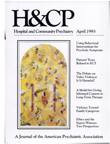Behavioral Interventions for Alleviating Psychotic Symptoms
Abstract
Behavioral interventions can augment the effects of antipsychotic medication in alleviating ballucinations, delusions, and conceptual disorganization. Such interventions may be based on operant conditioning and reinforcement strategies and on training in coping skills. Reinforcement strategies have been used to decrease the rate of confused speech, delusional talk, and other psychotic behaviors, but they appear to have little effect on the subjective distress patients experience as a result of such symptoms. Strategies that teach patients skills for coping with psychotic symptoms include cognitive reframing methods, nonconfrontational methods that help patients find alternative explanations for delusions, and use of humming to interfere with subvocal movements of the larynx muscles, which may be related to auditory ballucinations. The authors review studies of the effectiveness of these interventions and suggest an approach integrating reinforcement and training in coping skills that may help reduce psychotic symptoms.
Access content
To read the fulltext, please use one of the options below to sign in or purchase access.- Personal login
- Institutional Login
- Sign in via OpenAthens
- Register for access
-
Please login/register if you wish to pair your device and check access availability.
Not a subscriber?
PsychiatryOnline subscription options offer access to the DSM-5 library, books, journals, CME, and patient resources. This all-in-one virtual library provides psychiatrists and mental health professionals with key resources for diagnosis, treatment, research, and professional development.
Need more help? PsychiatryOnline Customer Service may be reached by emailing [email protected] or by calling 800-368-5777 (in the U.S.) or 703-907-7322 (outside the U.S.).



